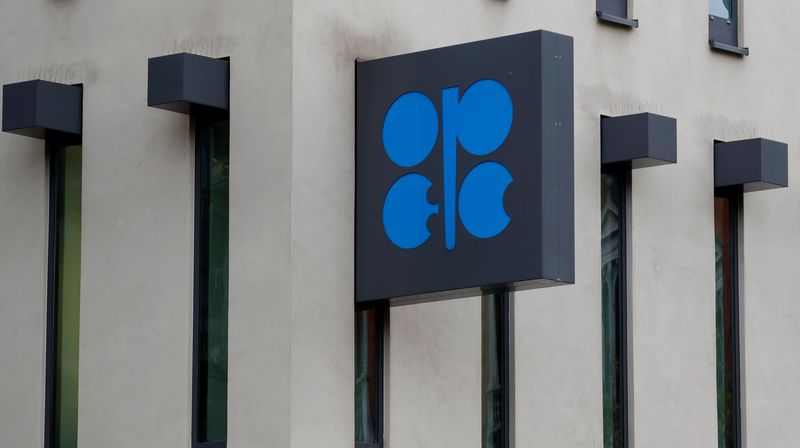By Shadia Nasralla, Julia Payne and Alex Lawler
LONDON/GENEVA/VIENNA (Reuters) -OPEC+ looks set to cut output when it meets on Wednesday, curbing supply in an oil market that energy company executives and analysts say is under strain from robust demand, lack of investment and production problems.
The potential OPEC+ cut could spur a recovery in oil prices that have dropped to about $90 from $120 three months ago due to fears of a global economic recession, rising U.S. interest rates and a stronger dollar.
OPEC+, which includes Saudi Arabia and Russia, surprised the market by suggesting output cuts in excess of one million barrels per day (bpd), sources from the group have said in what would be the biggest output cut since the pandemic.
Saudi Arabia and other members of the Organization of the Petroleum Exporting Countries and allied producers (OPEC+) have said they seek to prevent volatility rather than to target a particular oil price.
On Tuesday, international benchmark Brent crude rose nearly 3% above $91 per barrel [O/R].
"Such a decision would be difficult to justify fundamentally, as the oil market suffers anything but a surplus," said Norbert Rucker, Julius Baer's head of economics.
"The petro-nations seem willing to exploit their power to artificially prop up oil prices, increasing the tensions with the oil consumers."
The West has accused Russia of weaponising energy as Europe suffers from a severe energy crisis and may face gas and power rationing this winter in a blow to its industry.
Moscow accuses the West of weaponising the dollar and financial systems such as SWIFT in retaliation for Russia sending troops into Ukraine in February. The West accuses Moscow of invading Ukraine while Russia calls it a special military operation.
Russia has formed part of the OPEC+ club since 2016. The group has cut and raised output to manage the oil market but has rarely performed cuts when the market is tight.
A significant cut is likely to anger the United States, which has put pressure on Saudi Arabia to pump more to help weaken oil prices and reduce revenue for Russia.
Saudi Arabia has not condemned Moscow's actions and relations are strained between the kingdom and the administration of U.S. President Joe Biden, who travelled to Riyadh earlier this year but failed to secure any firm cooperation commitments on energy.
TIGHT SUPPLY
As OPEC+ gathered in Vienna for its first in-person meeting since the COVID pandemic took hold in 2020, Saudi Energy Minister Prince Abdulaziz bin Salman said he would keep the market in suspense until Wednesday, while declining further comment.
At an energy conference in London, top oil industry executives said oil consumption is resilient and the global market faces supply constraints.
Saudi Aramco (TADAWUL:2222)'s Chief Executive Amin Nasser said the oil market is disregarding the reality that global spare capacity to raise oil production is very low.
"(The market is) focusing on what will happen to demand if recession happens in different parts of the world. They are not focusing on supply fundamentals," Nasser told the Energy Intelligence Forum.
Shell (LON:RDSa) Chief Executive Ben van Beurden, speaking at the same conference, said current prices do not easily translate into a shift in capital allocation given it can take decades for oil and gas projects to produce and start paying off.
Saad Rahim, chief economist of commodity trading house Trafigura, said economic pain may not dent demand as much as the market expects.

"All the different factors suggest, yes, we may be heading into a slowdown but it will be shorter and shallower than people are expecting," Rahim said at the Argus European Crude Conference in Geneva.
OPEC+ has already struggled to produce at agreed levels due to underinvestment and is pumping more 3 million bpd below its targets.
(Writing By Noah Browning. Editing by Jane Merriman and Barbara Lewis)